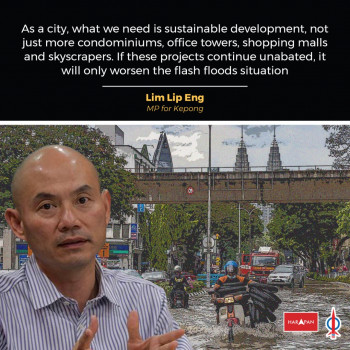by Lim Mun Fah and translated by Dominic Loh
Reasonable increments have never become an issue at all.
While there are justifiable reasons for the RM1.5 billion early pay adjustments for the country’s civil servants, the same never fails to arouse controversies from people on different sides of the political divide.
There are some 1.42 million civil servants in this country, and the increments will benefit each and every one of them, including the 50,000 whose contracts will expire by the end of this year, as their services will most likely be extended for another year.
Let’s put aside the question whether the 1.42 million civil servants make up an opulent part of the country’s 28 million population (about one in every 20 Malaysians), and let’s also put aside the question whether the proposed increments will add to the country’s burden or jazz up public service productivity. Increments for civil servants have oddly become a rare “consensus” among ruling and opposition parties which are inclined to find faults with each other in almost everything.
Such a consensus needs no profound economic theories to sustain. Anyone with the most fundamental arithmetic abilities will be able to deduce that such a manoeuvre is well worth the effort.
Let’s do some simple calculations: There are 1.42 million civil servants in the country, and let’s suppose each household is made up of an average of four members, and this will bring us a total of 5.68 million people benefiting from the government’s latest generosity. And if each household has five members, then the total will swell to 7.10 million.
Now let’s take a look at another figure. According to the latest electorate statistics, there are 13.29 million Malaysians eligible to vote in the coming general election.
You should by now see the ratio of civil servants and their families to the overall voter population. If we take 5.68 million, it is almost half of the number of eligible voters in the country, and the ratio will well exceed half if we take 7.10 million.
Of course, the actual figure may not be that high, as we must exclude minors not eligible to vote. If we take only three people for each household, the total beneficiaries will stand at 4.26 million, almost a third of all eligible voters.
The most formidable bedrock of democracy is the electorate. Given the political reality where every vote counts, accommodating public desires has provided the most reliable assurance for secured ballot support.
The 1.42 million-strong civil servants along with their family members should form a powerful force that will tip the final election outcome, a fact no parties, ruling or opposition, can afford to ignore or contravene.
Given the fact that every party wants an additional vote count, it has now transcended beyond the question of right or wrong to increase civil servants’ salaries.
Public servants constitute a reckoned force in every single democratic election under the sun, whom rival parties would try their utmost to please.
The total ballot count is of paramount importance. No one would bother how much thinner our treasury will become, nor would they recall the austerity drive we once championed loudly.
_________________________________



